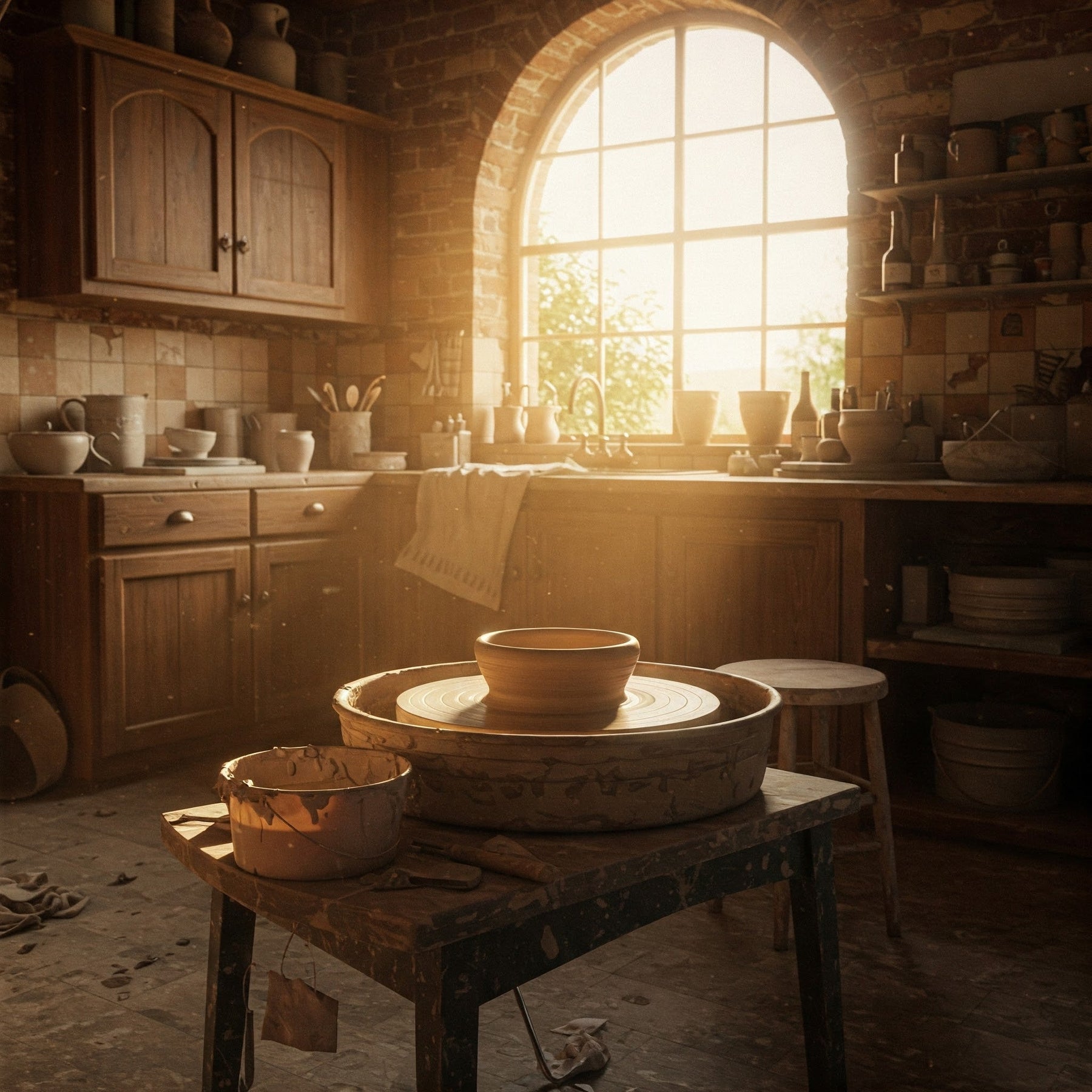
Where to Use a Pottery Wheel: Best Locations for Every Potter
Ever dreamt of spinning clay but unsure where to use Pottery Wheels? Short answer: studios, community centres, or even your own home—if you've got the location & storage sorted! From drop-in workshops to full-blown memberships, we’ve got the best spots to get messy, creative, and maybe even impress your nan. Keep reading!
Setting Up Your Pottery Wheel at Home
Dedicated Studio Space vs. Multi-Purpose Areas
Not everyone has a spare room to dedicate to pottery, but finding the right setup makes all the difference.
-
Dedicated Studio: Perfect for serious potters who want an organised, permanent space.
-
Multi-Purpose Area: Great for hobbyists working around other household activities.
If you’re tight on space, consider foldable tables and portable shelves to keep things tidy when not in use.
Garage or Basement Setup
-
Pros: Plenty of room, easy to contain mess, ideal for kilns.
-
Cons: Might need extra insulation or heating in colder months.
Spare Room Conversion
-
Pros: Convenient and comfortable.
-
Cons: Clay dust means extra cleaning—ventilation is key!
Outdoor Covered Areas
-
Pros: Natural light, fresh air, and minimal indoor mess.
-
Cons: Weather-dependent—damp clay and rain don’t mix.
Essential Requirements for Home Setup
Electrical Outlets and Power Supply
-
Ensure your space has a safe power source for an electric wheel and a kiln.
Water Source and Drainage
-
A nearby sink or water bucket is a must, but avoid pouring clay slurry down the drain—it clogs pipes!
Ventilation and Dust Control
-
Use HEPA filters and good airflow to manage airborne clay dust.
Adequate Lighting
-
Natural light is best, but bright LEDs keep visibility sharp for fine details.
Space Considerations and Layout
Wheel Placement and Accessibility
-
Position your wheel so you can sit comfortably and move freely.
Clay Storage and Preparation Area
-
Use sealed containers to keep clay fresh and easy to access.
Drying and Glazing Space
-
Shelving or racks help prevent damage to drying pieces.
Pottery Studios and Community Centres
Accessing Shared Studio Spaces
Membership Benefits and Costs
-
Studios offer monthly memberships, with fees ranging from £40 to £120 per month depending on location and amenities.
Equipment Availability and Maintenance
-
Shared spaces often have high-quality wheels and kilns, saving you money on equipment.
Community Atmosphere and Networking
-
Studios foster a creative environment, where potters swap ideas and inspiration.
Pottery Classes and Workshops
Learning from Experienced Instructors
-
Hands-on guidance helps fast-track your skills.
Utilising Studio Resources
-
Access to professional tools and materials enhances your work.
Project Guidance and Support
-
Instructors provide personalised feedback, helping you refine techniques.
Community Centre Programmes
Recreational Pottery Activities
-
Perfect for casual potters looking for a fun, social experience.
Educational Opportunities
-
Many offer low-cost or subsidised classes for beginners.
Educational Institutions and Schools
Art Departments in Colleges and Universities
Advanced Pottery Courses
-
Courses range from short-term intensives to full-degree programmes.
Studio Access for Students
-
University studios provide state-of-the-art equipment.
Faculty Guidance and Critiques
-
Professors offer structured learning and critical feedback.
High School and Middle School Art Programmes
Introduction to Pottery Techniques
-
Teaches basic skills like pinching, coiling, and throwing.
Supervised Studio Time
-
Students practice with teacher support.
Student Projects and Exhibitions
-
Schools encourage creativity with pottery showcases.
Specialty Art Schools and Workshops
Intensive Pottery Training
-
Short courses offer deep dives into specific techniques.
Masterclasses and Guest Artists
-
Learn from renowned ceramicists and industry experts.
Professional Pottery Studios and Businesses
Setting Up a Commercial Pottery Studio
Business Planning and Licensing
-
Research permits, insurance, and legal requirements.
Equipment Investment and Maintenance
-
Budget for wheels, kilns, and high-quality materials.
Production Space and Workflow
-
Efficient layout keeps production smooth and organised.
Retail and Gallery Spaces
Displaying and Selling Pottery
-
Well-lit, creative displays attract buyers.
Customer Interaction and Sales
-
Live demonstrations can boost engagement.
Studio Tours and Demonstrations
-
Offering tours educates customers and encourages sales.
Production and Manufacturing
Large-Scale Pottery Production
-
Requires dedicated factory space and advanced equipment.
Wholesale and Distribution
-
Bulk sales need careful logistics and storage planning.
Outdoor and Mobile Pottery Setups
Setting up at Art Fairs and Markets
Portable Pottery Wheels and Equipment
-
Compact wheels like the Shimpo Aspire are great for travel.
Power and Water Considerations
-
Use battery-operated wheels and portable water tanks.
Display and Sales Strategies
-
Engaging demos draw in customers.
Mobile Pottery Workshops and Events
Bringing Pottery to Schools and Community Centres
-
Pop-up classes make pottery accessible.
On-Site Demonstrations and Lessons
-
Perfect for interactive learning.
Event Planning and Logistics
-
Requires permits, transport, and coordination.
Outdoor Studio Spaces
Natural Lighting and Ventilation
-
Ideal for energy-efficient, inspiring workspaces.
Weather Protection and Considerations
-
Invest in awnings or sheds for year-round use.
Integrating with Nature
-
Outdoor pottery fosters creativity and relaxation.
Choosing the Right Location for Your Pottery Wheel
Factors to Consider
Space and Accessibility
-
Ensure you have enough room for comfortable movement.
Cost and Budget
-
Compare costs between home setups and studio rentals.
Community and Support
-
Studios offer networking and motivation.
Skill Level and Goals
-
Choose a space based on your long-term pottery ambitions.
Pottery Studio Comparison Chart
|
Location Type |
Cost Estimate |
Best For |
|
Home Studio |
£200-£1,500 setup |
Hobbyists, professionals |
|
Shared Studio |
£40-£120/month |
Social learners, semi-pros |
|
University Studio |
Included in tuition |
Students, aspiring pros |
|
Outdoor Studio |
£300-£800 setup |
Nature lovers, experimenters |
Conclusion: Finding Your Ideal Pottery Wheel Space
Wherever you set up, the key is comfort, accessibility, and creativity. Whether at home, in a shared studio, or outdoors, the right environment helps you thrive. Try different setups, connect with the community, and most importantly—keep spinning!


